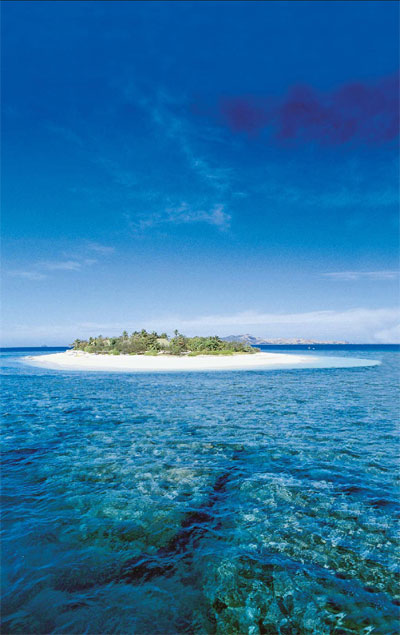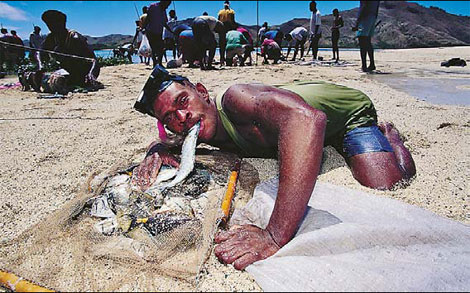|

Tourism is a major money spinner for the Pacific Islands. Photos provided to China Daily
|
Global warming could spell the end for a number of tiny island nations in the Pacific, Shi Yingying reports.
Despite their image of paradise on Earth, many Pacific Islands are struggling with environmental issues, such as rising sea levels caused by global warming, pollution, and conflicting relationships between the tourism industry, local culture and ecology.
Inside the Pacific Pavilion, visitors are drawn to the Vanuatu exhibition, which is decorated with fresh tropical flowers and indigenous wooden artworks. The travel poster hanging on the wall portrays this South Pacific Island as a paradise for honeymooners. There is no indication of the magnitude 7.5 quake it suffered earlier this month or the small tsunami that followed. Nor is there any sign of the active volcano on Tanna Island in the country's north.
After the earthquake on Aug 9 - its epicenter was 46 kilometers northwest of the capital Port Vila - the immediate reaction from Vanuatu's authorities was to urge people to move to higher ground.
|

Many Pacific Island nations are threatened by rising sea levels. Provided to China Daily
|
"Sea level readings indicate a tsunami was generated. A recorded wave amplitude of 23 centimeters has been observed at Port Vila," the Pacific Tsunami Warning Center said in an email alert.
When Iokapeta Selulo, from the tiny Pacific nation of Tuvalu and who works at the Pacific Pavilion, heard the news, she was fearful. "Imagine if it (the earthquake and tsunami) happened to us, we would have nowhere to escape - we don't have any higher ground," she said.
At just 26 square kilometers in land area, Tuvalu is the fourth smallest country in the world. The highest point on the island is only 5 meters above sea level.
"We don't have mountains to escape to and we depend on food imported from Fiji," Selulo said. "The beaches are disappearing. When there's a high tide, you can see seawater moving across roads."
During a king tide, which is what the islanders call the highest tides of the year, waves rolling off the ocean can have a devastating effect. The islands' (Tuvalu has eight islands) main roads are submerged and nearby homes are threatened by the rising waters.
It is estimated that in another 50 years, more than 60 percent of Tuvalu's land will disappear into the ocean, according to figures provided by the nation's meteorological department.
The islands' 10,000 citizens are now thinking about relocation. Not because they want to, but because they have to.
"More and more people leaving Tuvalu and moving to countries with bigger islands, like Fiji. Some of them are my family and friends. They tell me it's for a better education and jobs, but who knows? We never say it outright, but we know our worries are there," said Selulo.
Enchanted by island music and the notion of spending vacations in a Pacific paradise, visitors to the 8,100-square-meter Pacific Pavilion have little idea of the impending crisis faced by these tiny nations.
"Sinking islands? No, I have never thought of it in that way. For me, they are nothing more than faraway places of charm and mystery, and a destination for escape," said visitor Zhang Chi, 22, who just graduated from university and is working as an intern at a local newspaper.
As for Bernadette Rounds Ganilau, the director of the Pacific Pavilion who is responsible for the 16 Pacific Islands and related organizations exhibiting in the joint pavilion, the situation is even more serious than it sounds.
|

Fishing and tourism are the main revenue earners for most Pacific Island countries.
|

